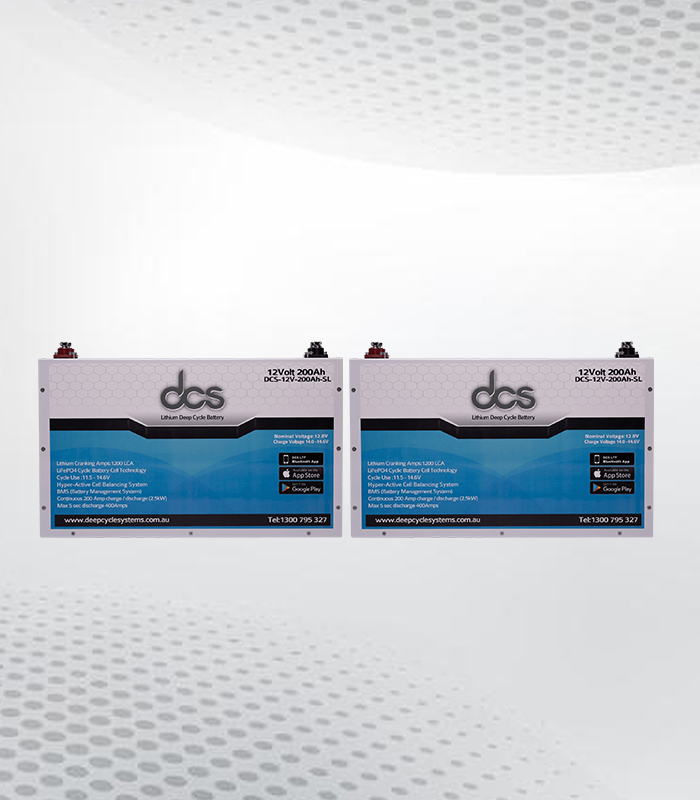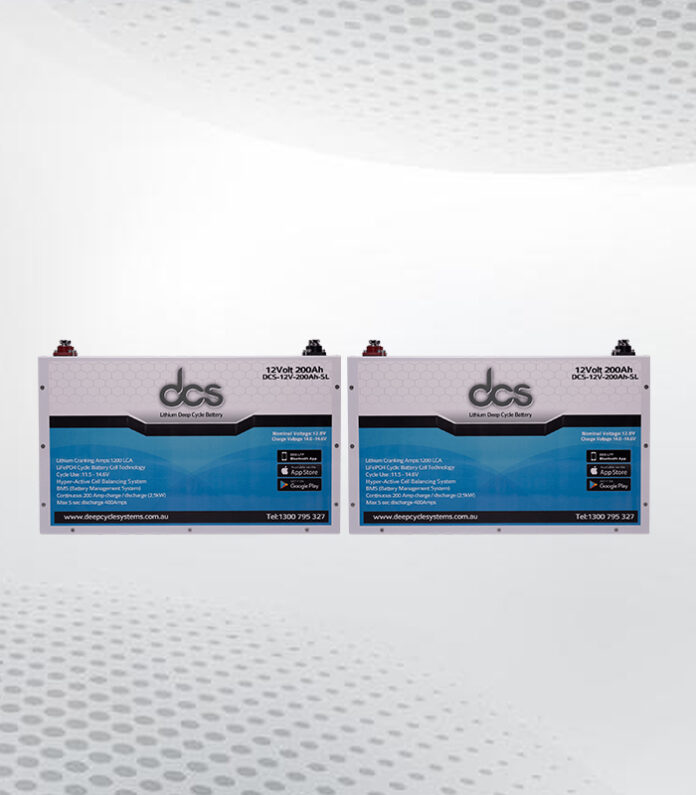When it comes to powering your electrical devices and appliances, having a reliable and long-lasting battery is crucial. One of the best options available in the market is the 180-Ah lithium battery. These batteries are known for their high energy density, lightweight design, and impressive lifespan. In this blog post, we will explore why the 12V 180Ah lithium battery is the ideal choice for your power needs.
The Basics of 180Ah Lithium Batteries
180Ah lithium batteries are distinguished by their use of lithium ions as the key active material within their electrolyte, positioning them as a preferred choice for an array of applications, from renewable energy solutions to the automotive sector. The ‘180Ah’ denomination signifies the battery’s storage capacity, which essentially means it can discharge a current of 180 amperes for an hour, or proportionally more for lower currents over longer periods. This characteristic is pivotal in applications demanding sustained power delivery over time, such as in solar power storage systems, where reliability over extended periods is crucial.
Unlike their predecessors, these batteries boast a remarkable energy density, which translates to a high power-to-weight ratio, making them not only efficient but also remarkably portable. This feature is especially beneficial in mobile applications, where weight and efficiency are paramount. Their rechargeable nature further underscores their sustainability edge, offering users the convenience of multiple use cycles without significant capacity loss. By leveraging the advanced chemistry of lithium ions, 180Ah batteries provide a compelling blend of longevity, efficiency, and environmental friendliness, making them a cornerstone in modern power storage and delivery solutions.
Why Choose Lifepo4 180Ah Batteries Over Others?
Opting for LiFePO4 180Ah batteries presents a multitude of benefits over conventional battery technologies. Chief among these is their robust safety profile, a crucial factor considering the potential hazards associated with battery use. LiFePO4 chemistry is inherently less prone to overheating and does not pose the same risk of catching fire as other lithium-based batteries, which is particularly reassuring for users prioritising safety in their applications.
Furthermore, these batteries excel in terms of thermal stability, maintaining performance across a wide range of temperatures without significant degradation. This thermal resilience makes them ideally suited for challenging environments, where extreme conditions might compromise the efficacy of less sturdy options.
Additionally, the low self-discharge rate of LiFePO4 batteries ensures that they retain their charge for longer periods when not in use, an attribute that enhances their convenience for users. This feature, combined with their ability to endure a higher number of charge-discharge cycles, positions LiFePO4 batteries as a superior choice for those seeking a reliable, long-term energy storage solution without the frequent need for replacements.
Optimising Your 180Ah Lithium Battery’s Performance
To enhance the performance and extend the lifespan of your 180Ah lithium battery, adopting a proactive approach towards maintenance and usage is essential. Ensuring the battery operates within its optimal temperature range is paramount; exposure to extreme temperatures can significantly impact its functionality and longevity. Regular cleaning to prevent the accumulation of dust and debris is also crucial, as this can interfere with the battery’s operation. Additionally, it is important to handle the battery with care to prevent any physical damage that could compromise its internal structure and efficiency. Implementing these strategies will contribute to maintaining the battery’s optimal performance, thereby ensuring it delivers reliable power over an extended period.
The Unmatched Advantages of a 180Ah LiFePO4 Battery
A key benefit of the 180Ah LiFePO4 battery is its unparalleled cycle life. These units can endure numerous charge and discharge cycles, remarkably prolonging their utility before any significant capacity reduction occurs. This aspect alone renders them an economically viable solution over the long term, considerably reducing the frequency of replacements. Besides, the safety aspect of LiFePO4 technology cannot be overstated.
Additionally, the environmental footprint of these batteries is minimised due to their longevity and the absence of toxic heavy metals, aligning with the growing preference for green and sustainable energy sources. Their adaptability across a broad spectrum of temperatures without performance compromise further enhances their appeal, ensuring consistent and reliable power in a variety of settings.

Understanding Your 180 ah lithium battery
- To maximise the lifespan and efficacy of your 180 Ah lithium battery, it’s paramount to adhere to best practices for charging and discharging.
- One should refrain from subjecting the battery to extreme states of charge; overcharging or depleting the battery beyond its recommended thresholds can precipitate irreversible damage, thereby impairing its performance and longevity.
- Equally, the ambient conditions where the battery is stored play a crucial role. It’s advisable to keep the battery in an environment that is cool and devoid of moisture, as excessive heat or humidity can accelerate the degradation of the battery’s internal components.
- Ensuring that the battery is not exposed to direct sunlight for protracted periods is also vital, as sustained UV exposure can detrimentally affect its structural integrity and functional capacity.
- By observing these guidelines, you can significantly enhance the operational lifespan of your 180-Ah lithium battery, ensuring it continues to deliver optimal performance across its service life.
Installation and Maintenance Tips for Your 180Ah Leisure Battery
For those utilising a 180-Ah lithium battery in leisure applications such as camper vans or marine crafts, it’s paramount to engage in regular upkeep to sustain its performance. Key among maintenance practices is the vigilant monitoring of the battery’s voltage and state of charge. Allowing the battery to remain in a depleted condition for prolonged periods can be detrimental to its health. Equally important is the establishment of a well-ventilated area for the battery compartment. This ensures that any potential build-up of heat is effectively dissipated, maintaining the battery’s operational integrity and preventing the risks associated with overheating.
It is also advisable to conduct periodic inspections for any signs of wear or damage, addressing any issues promptly to avert potential failures. Additionally, ensuring that connections are clean, tight, and free from corrosion will aid in maintaining optimal performance. To further safeguard the battery’s longevity, avoid exposing it to extreme temperature fluctuations, as consistent ambient conditions help in preserving the battery’s structural and functional efficacy. By adhering to these guidelines, you can effectively maintain the health and efficiency of your 180Ah leisure battery, securing its role as a dependable power source in your recreational ventures.
Exploring the Durability of 180Ah Lithium Batteries
The resilience and longevity of 180 Ah lithium batteries are fundamental attributes that make them stand out in the realm of power storage solutions. These batteries are engineered to withstand the rigours of both high-demand applications and everyday use, ensuring that they remain a reliable source of power over an extended period. The inherent stability of lithium ions contributes to the battery’s robustness, enabling it to maintain performance even under the strain of frequent charging and discharging cycles.
The architecture of these batteries incorporates advanced materials and design principles that minimise wear and tear, thereby enhancing their durability. A key aspect of their construction is the ability to resist common degradation processes, such as the breakdown of electrolytes and the deterioration of electrode materials, which are typical challenges faced by lesser-quality batteries. This resistance to internal degradation mechanisms significantly extends the operational life of 180 Ah lithium batteries, making them a cost-effective choice in the long run.
Moreover, the implementation of sophisticated battery management systems (BMS) plays a pivotal role in safeguarding the battery’s integrity. These systems meticulously monitor and control the charging and discharging processes, preventing scenarios that could otherwise lead to premature battery failure. Through such meticulous design and management, 180 Ah lithium batteries epitomise durability, offering users the assurance of sustained performance and reliability.
Future Trends in Lithium Battery Technology
The horizon of lithium battery technology is illuminated by promising developments that aim to redefine energy storage. Innovations in material science are at the forefront, with researchers exploring novel electrode materials that could significantly enhance the energy density and charging speed of batteries. This exploration includes the potential integration of graphene and silicon, which could offer a leap in capacity and efficiency.
Another emerging trend is the focus on sustainability, where the lifecycle of batteries, including recyclability and the use of environmentally benign materials, is gaining emphasis. Efforts are also underway to improve the safety profiles of lithium batteries, with advances in solid-state battery technologies presenting a viable path towards non-flammable and more stable battery systems.
Furthermore, the integration of smart technology into battery systems is expected to improve diagnostics and management, ensuring optimal performance and longevity. These strides in research and development signal a future where lithium batteries could offer even more robust, efficient, and sustainable solutions for a myriad of applications.
Optimising Performance of 180Ah Lithium Batteries
To maximise the utility and durability of your lithium battery, adopting certain practices is key. A pivotal aspect to consider is the ambient temperature in which the battery operates. Extreme cold or heat can adversely affect the battery’s efficiency and may lead to premature degradation. It’s advisable to store and use the battery within its recommended temperature range to maintain optimal performance.
Additionally, keeping the battery clean from dust and debris ensures that there is no unnecessary obstruction or contamination that could potentially impact its functioning.
Regular monitoring and balancing of the cells within the battery are crucial. This can be effectively managed with a sophisticated Battery Management System (BMS), which not only helps in safeguarding against overcharging and deep discharge but also assists in maintaining uniformity across all cells, thereby enhancing the overall performance and longevity of the battery.
Another aspect to consider is the physical handling of the battery. Avoid any form of rough treatment or impacts, as these can cause internal damage to the cells, compromising the battery’s integrity and performance. By paying attention to these details and implementing regular checks, you can ensure that your 180-Ah lithium battery remains in prime condition, offering reliable service and maximising its lifespan.
FAQs
1. Can I use a 12V 180Ah lithium battery for my off-grid solar system?
Yes, a 12V 180Ah lithium battery is highly suitable for off-grid solar systems. Its capacity to store substantial energy makes it ideal for applications requiring sustained power over extended periods. It’s also compatible with solar charging systems, offering an efficient and eco-friendly solution for energy storage.
2. How long does a 180Ah lithium battery last before needing replacement?
The lifespan of a 180Ah lithium battery varies depending on usage and maintenance. Typically, these batteries can last for several years, with LiFePO4 variants offering up to 2000-5000 charge cycles before significant capacity reduction. Proper care, including adhering to recommended charging practices and avoiding exposure to extreme temperatures, can extend their lifespan further.
3. Is it safe to use a LiFePO4 180Ah battery in my caravan?
Absolutely. LiFePO4 batteries are known for their safety due to their stable chemical composition, which significantly reduces the risk of overheating or fire. This makes them an excellent choice for caravans, yachts, and other recreational vehicles where safety and reliability are of utmost importance.
Conclusion
In summarising, Its remarkable energy density, safety profile, and long life cycle make it an unbeatable option for those seeking reliable, sustainable power solutions. By adhering to proper maintenance and usage practices, users can further enhance the performance and longevity of their batteries, ensuring they receive the best return on their investment. With the ongoing advancements in lithium battery technology, the future looks even brighter for these power storage solutions, promising even greater efficiency and sustainability.
This Article Was First Published On
| Other Good Articles to Read |
| Blogs-Nation |
| Blogs-Peoples |
| Bryan Smith Blogs |
| Intellect Blogs |
| The Fault In Our Blogs |
| Blogs Eu |
| Oz Forums |
| Recruitment Blogs |
| Zet Blogs |
| Id Blogs |
| Blogs Tudiolegale |
| Related Business Listings |
| Directory Submissions |
| Regional Directory |

